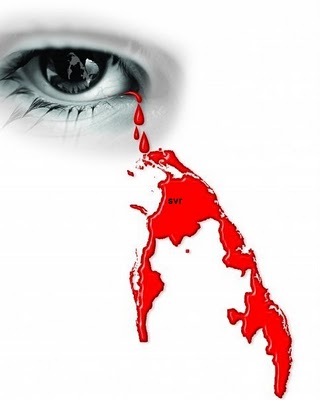For the first time in the history of Eezham Tamils they have moved to evolve an international polity for themselves, independent of armed struggle, through the concept of transnational governance. The space available today, especially in the diaspora, has to be made the best use of in forging an innovatively democratic structure that should be contributing not only to the cause of Eezham Tamils, but also challenging and shaping a global system that is inadequate in handling a crisis like that of Eezham Tamils. Conceiving the transnational government as a 'post-defeat' organ for collaboration will be the greatest ever tragedy in the polity of Eezham Tamils.
TamilNet Editorial BoardTransnational government is an innovative concept and a major political step Eezham Tamils in the diaspora opted for after the war in Vanni.It is now six months since the efforts were called for and is thus time for stock taking.Even though the transnational move suffers from an inherent liability that it was insinuated by factional politics at the very outset, that should not be allowed to discredit the noble cause, and the diaspora Tamils should act vigilantly and boldly if necessity arises for any course correction.The most fundamental problem with the transnational move is that it has failed to bring out the national aspiration and aim of Eezham Tamils in concrete terms. Mincing with words and harping on ambiguous concepts are not ways to lay a sound foundation to the novel and global political move.Why the hesitation in telling that the Transnational Government of Tamil Eelam is conceived to globally represent the national aspiration of Eezham Tamils to form an 'independent and sovereign state of Tamil Eelam' in the island of Sri Lanka?If it is argued that laying the political foundation is the work of the first assembly elected, then there should have been total abstention from telling anything at all – neither the phrase right to self-determination nor the nametag Tamil Eelam.On the contrary, some of the functionaries and some personalities claiming as supporters of the transnational move have entered into controversy in the last few months in many countries by openly opposing democratic political moves upholding national aspirations such as the re-mandate of the main principle of Vaddukkoaddai Resolution and the formation of Country Councils that stand for independent and sovereign Tamil Eelam. Thus they have created an image that the transnational move stands for revisionism. They have every right to have that shade of political opinion. But this has to be debated in an elected assembly. A few cannot hijack the whole concept of transnational government to revisionism even before its inception. Let people of that shade of opinion get elected if they command support, to democratically argue the case in the assembly.Re-mandated independence and sovereignty of Eezham Tamils and elected country councils are the grassroot strengths for the transnational government. They in fact internationally legitimise and insure the security of transnational government from power manipulations. Such exercises train and produce a wide spectrum of a new breed of democratic politicians in our nation.The transnational government move should welcome and encourage such democratic exercises, prior to its formation, ultimately to get an overwhelming support for its own formation.While showing reluctance to accept the term and principles of the mandated Vaddukkoaddai Resolution in its entirety, transnational functionaries and supporters show keenness in citing various subsequent premises adopted for failed talks such as Thimphu.Those who are unhappy about the term Vaddukkoaddai may drop the name, but that is not an excuse for dumping its main mandated principle of independence and sovereignty, and stopping with self-determination of Thimphu or internal self-determination of Oslo.To what extent the formation moves of the transnational government and appointment of organisers were transparent in the last six months and why its policy outline of June, appearing in its website, has still not found with any point worthy enough for revision, are questions asked in diaspora circles.Another widely prevalent misconception about transnational government comes from confusing it with government in exile.Transnational government is not government in exile. Transnational government comes from the diaspora because of a unique situation of the Eezham Tamil diaspora - in its distribution, in its peculiar disposition to face a whole world and in its needs to look after its kith and kin in the home country as well as to look after itself.Transnational Government of Eezham Tamils (not Tamil Eelam) will stay in the diaspora even after Tamil Eelam is achieved. Therefore, the political foundations of the transnational government have to be laid with lot of far sight, self-reliance and with independent thought, if this government has to withstand any global eventuality that may unfold. The foundations cannot be guided by immediate power equations around us.While it is a foregone conclusion that democracy is going to be the means of political organisation, it is also time for Eezham Tamils to start thinking on the shade of democracy to be pursued for the current needs of the struggle. The oppressed context of our nation demands the adoption of radical democracy even for achieving true liberal democracy advocated by many in the Tamil society.Diaspora should seriously think of fielding and choosing right candidates to make the experiment successful and beneficial to the cause.No one coming from a victimised nation like ours would mean harm to the nation in his or her line of political thinking. They all may mean good. But risk cannot be taken with an apex body such as the transnational government.We don’t need a transnational government for collaboration politics. We have enough parties for that.

No comments:
Post a Comment